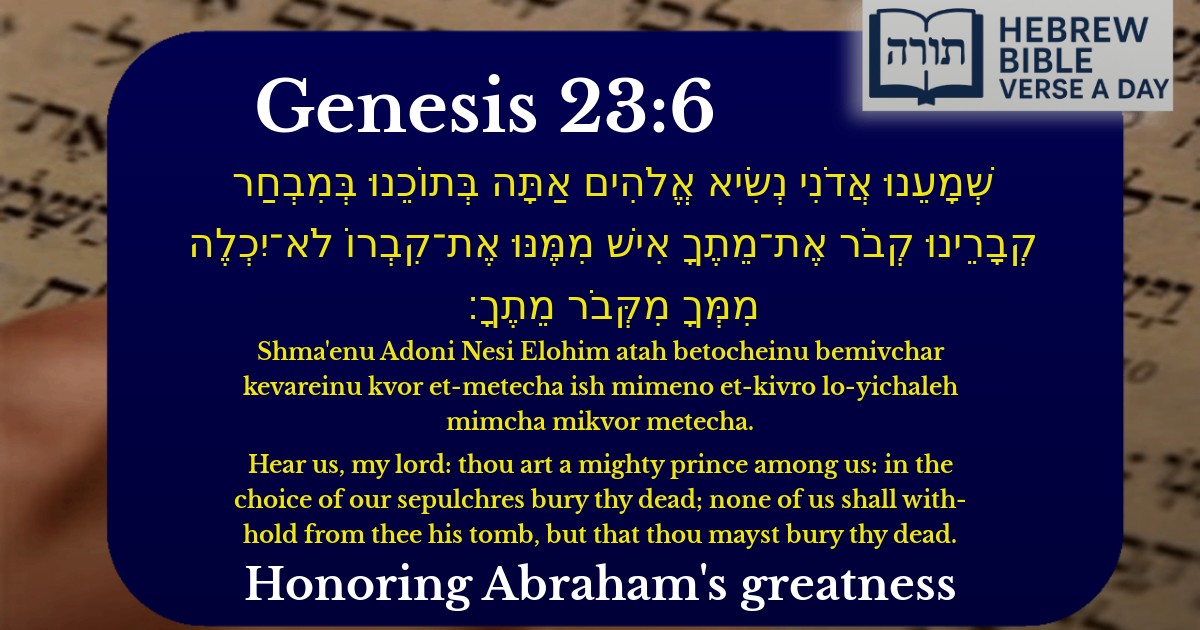Join Our Newsletter To Be Informed When New Videos Are Posted
Join the thousands of fellow Studends who rely on our videos to learn how to read the bible in Hebrew for free!
Hebrew Text
שְׁמָעֵנוּ אֲדֹנִי נְשִׂיא אֱלֹהִים אַתָּה בְּתוֹכֵנוּ בְּמִבְחַר קְבָרֵינוּ קְבֹר אֶת־מֵתֶךָ אִישׁ מִמֶּנּוּ אֶת־קִבְרוֹ לֹא־יִכְלֶה מִמְּךָ מִקְּבֹר מֵתֶךָ׃
English Translation
Hear us, my lord: thou art a mighty prince among us: in the choice of our sepulchres bury thy dead; none of us shall with- hold from thee his tomb, but that thou mayst bury thy dead.
Transliteration
Shma'enu Adoni Nesi Elohim atah betocheinu bemivchar kevareinu kvor et-metecha ish mimeno et-kivro lo-yichaleh mimcha mikvor metecha.
Hebrew Leining Text
שְׁמָעֵ֣נוּ <b>׀</b> אֲדֹנִ֗י נְשִׂ֨יא אֱלֹהִ֤ים אַתָּה֙ בְּתוֹכֵ֔נוּ בְּמִבְחַ֣ר קְבָרֵ֔ינוּ קְבֹ֖ר אֶת־מֵתֶ֑ךָ אִ֣ישׁ מִמֶּ֔נּוּ אֶת־קִבְר֛וֹ לֹֽא־יִכְלֶ֥ה מִמְּךָ֖ מִקְּבֹ֥ר מֵתֶֽךָ׃
שְׁמָעֵ֣נוּ ׀ אֲדֹנִ֗י נְשִׂ֨יא אֱלֹהִ֤ים אַתָּה֙ בְּתוֹכֵ֔נוּ בְּמִבְחַ֣ר קְבָרֵ֔ינוּ קְבֹ֖ר אֶת־מֵתֶ֑ךָ אִ֣ישׁ מִמֶּ֔נּוּ אֶת־קִבְר֛וֹ לֹֽא־יִכְלֶ֥ה מִמְּךָ֖ מִקְּבֹ֥ר מֵתֶֽךָ׃
🎵 Listen to leining
Parasha Commentary
📚 Talmud Citations
This verse is not quoted in the Talmud.


Context of the Verse
This verse (Genesis 23:6) is part of the dialogue between Avraham Avinu and the children of Chet (Hittites) when he sought to purchase a burial plot for Sarah Imenu. The Hittites recognize Avraham's elevated status and offer him the choicest of their burial sites.
Explanation of Key Phrases
Halachic and Ethical Insights
The Gemara (Sanhedrin 46b) derives from this exchange the importance of honoring the dead with a proper burial. Avraham's insistence on purchasing the cave (rather than accepting it as a gift) teaches the principle of avoiding dependency on others, as noted by the Chofetz Chaim in his writings on ethical conduct.
Symbolism of the Burial Site
The Kli Yakar emphasizes that the cave of Machpelah (later purchased by Avraham) represents the connection between physical and spiritual worlds. Its dual nature (as hinted by the name "Machpelah," meaning "double") symbolizes the eternal bond of the Jewish people with Eretz Yisrael and the Olam Haba (World to Come).